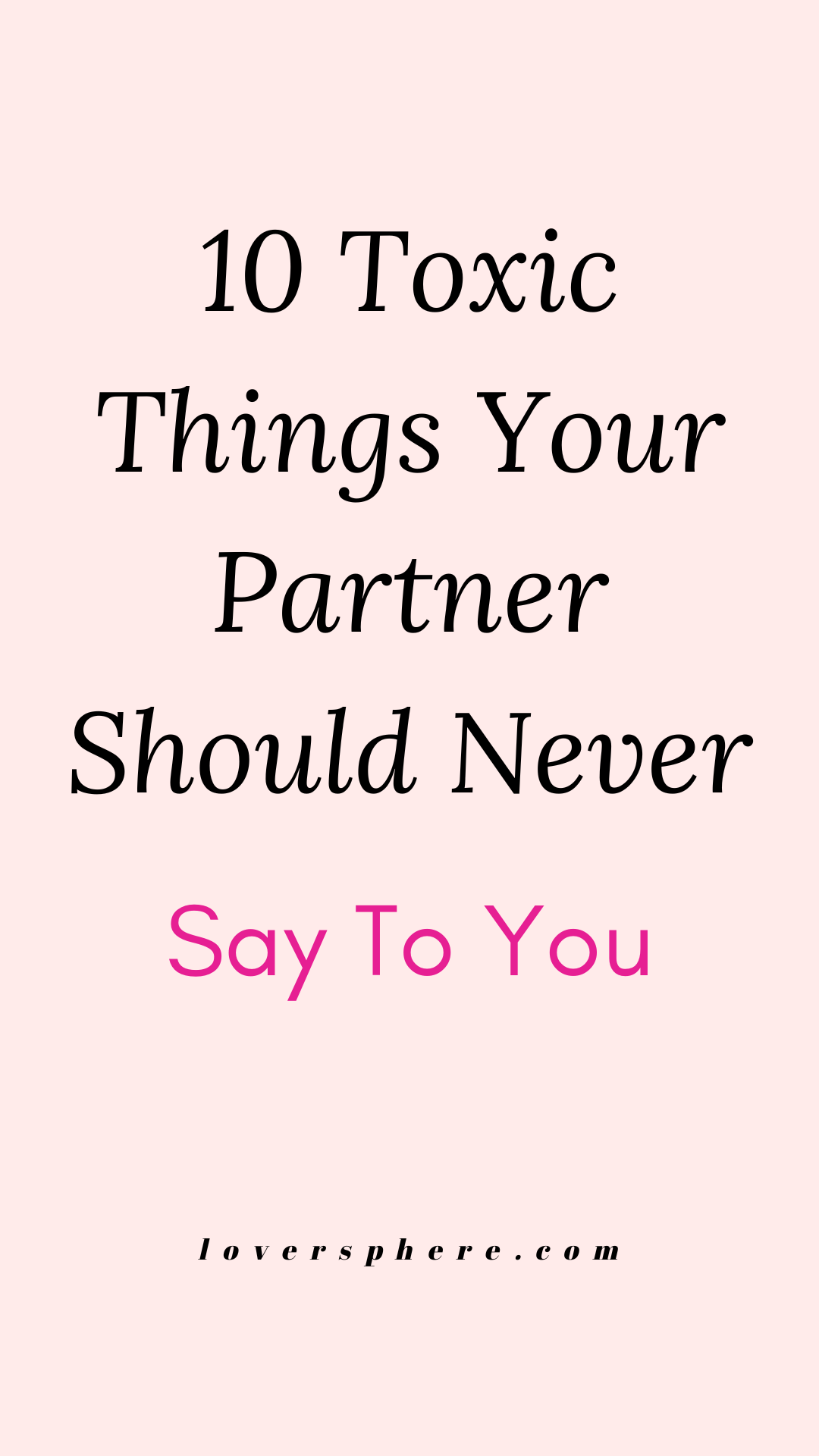
In any relationship, communication is key to building trust, respect, and understanding. But sometimes, words can cause deep wounds, especially when they come from someone we love.
While disagreements and misunderstandings are part of every relationship, certain things should never be said, no matter how upset or frustrated we may feel. These hurtful comments can damage emotional connections, breed resentment, and even threaten the future of the relationship.
In this blog post, we’ll explore 10 things your partner should never say to you, helping to identify the lines that should never be crossed in healthy communication. Understanding these can foster more thoughtful conversations and a stronger, more respectful relationship.

10 Hurtful Things Your Partner Should Never Say To You
Some words can be incredibly hurtful in a relationship. Certain phrases, when spoken, can cause lasting emotional pain. Let’s explore these 10 things your partner should never say to you.
1. You’re too sensitive

When someone says “You’re too sensitive,” it’s a way of dismissing your feelings, making you feel unheard, unimportant, or even blamed for reacting. This can break down trust and make it hard to express yourself.
The phrase invalidates your emotions and shifts the blame onto you, instead of addressing the real issue. A better way to handle this is for both partners to listen, acknowledge each other’s feelings, and work together to find a solution.
Your emotions matter and deserve to be respected. If you often hear you’re “too sensitive,” it may be time to re-evaluate your relationship and prioritize your emotional well-being. By doing so, you can create a more supportive and understanding environment for your emotions.
2. You’ll never be good enough

The phrase “You’ll never be good enough” is a damaging statement that can deeply affect your self-esteem and confidence. It suggests that you’re flawed and undeserving of love or acceptance.
Hearing this repeatedly can lead to self-doubt, anxiety, and even mental health struggles. It’s emotionally ab#sive and discouraging, hindering personal growth and creativity. A partner should never use this kind of language.
In a healthy relationship, the goal is to lift each other up, not bring each other down. If you’re constantly faced with hurtful comments like “you’ll never be good enough,” it might be time to rethink the relationship and prioritize your emotional well-being.
Rather than dwelling on weaknesses, focus on strengths, give constructive feedback, and provide support. This approach helps you grow, reach your goals, and pursue your passions.
3. You’re lucky I’m even with you
The phrase “You’re lucky I’m even with you” is often used in relationships to suggest that you don’t deserve love or attention. It implies that your partner is doing you a favor by being in your life and that you should be grateful for their tolerance.
This kind of conditional love can negatively affect your self-worth, causing anxiety and insecurity, and can lead to mental health issues like depression.
Using this phrase is emotionally manipulative, disrespectful, and toxic. It creates an environment that stifles personal growth, confidence, and self-esteem. Instead of feeling lucky, your partner should show genuine appreciation, respect, and love, fostering a healthy and supportive relationship.
Remember, you deserve to be with someone who values you for who you are, not someone who makes you feel like you’re lucky to be with them.
4. I don’t care

The phrase “I don’t care” can be very hurtful and dismissive. It suggests that your feelings aren’t valued, your partner isn’t invested in the relationship, and your well-being isn’t important. Hearing this can make you feel ignored, undermine your self-esteem, and harm the relationship.
A better approach would be for your partner to listen to your perspective, show understanding, and work with you to find solutions that benefit both of you. Remember, healthy relationships thrive on empathy, mutual respect, and emotional closeness.
If “I don’t care” becomes a recurring phrase, it might be time to assess whether the relationship is truly supporting your emotional needs because a relationship built on empathy, open communication, and shared effort will be much healthier and more fulfilling.
5. Why can’t you be more like [someone else]?
The phrase “Why can’t you be more like [someone else]?” is damaging and can make you feel like you’re not good enough. It suggests that someone else is better or that you need to change to meet their expectations, which can hurt your self-esteem and cause problems in the relationship.
This type of comparison is harmful because it’s emotionally ab#sive, unrealistic, and unfair. Expecting someone to change who they are to match another person’s standards isn’t reasonable, and comparing someone negatively to others is hurtful. It creates a toxic environment where people can’t be themselves.
A better approach is to appreciate and love you for who you are, value and accept your unique qualities, and communicate openly and honestly without comparing you to someone else.
Remember, you deserve to be loved and appreciated for who you are, without being compared to someone else.
6. You’re overreacting

“You’re overreacting” is a phrase that invalidates someone’s emotions and downplays their experiences. It tells the other person their feelings don’t matter or aren’t worth acknowledging, which can lead to them feeling unheard and doubting their own emotional responses. Over time, it can damage emotional well-being and erode trust in the relationship.
This kind of dismissive behavior creates a barrier to healthy communication and emotional connection. It’s something your partner should avoid saying.
A better way to handle emotional situations is to listen, acknowledge your partner’s feelings, and work on solving the issue together. Active listening helps you understand their perspective, shows that you value their feelings, and builds empathy.
Instead of dismissing concerns, focus on finding a solution as a team. Emotions are valid, and your partner should respect and recognize them. If you’re constantly being told you’re overreacting, it may be a sign to reassess the relationship and focus on your emotional well-being.
When feelings are acknowledged, both partners can work together to address problems in a healthy way.
7. I regret being with you

Saying “I regret being with you” can be deeply hurtful and damaging to someone’s emotional well-being. It can make you feel unwanted, unappreciated, and even trapped in the relationship.
Hearing this can lead to feelings of low self-esteem, anxiety, and uncertainty about where the relationship is headed. The emotional toll is significant, affecting your mental health and creating a toxic environment.
This phrase breaks down trust and emotional intimacy, making it harder to communicate and grow together. A healthy relationship should involve open, honest communication and a willingness to work through problems. Instead of regret, your partner should show appreciation for you and the relationship.
If you’re in a situation where your partner expresses regret for being with you, it may be a sign to reassess the relationship. You deserve to feel valued, loved, and appreciated. Putting your emotional well-being first is important for having a healthier and more fulfilling relationship.
8. You’re crazy

The phrase “You’re crazy” can be really harmful in relationships. It’s often used to dismiss your feelings or perspective, which can lead to self-doubt and make you question your emotions.
This kind of behavior is a form of gaslighting, which can damage your mental health, erode your self-esteem, and create a controlling dynamic.
Instead of dismissing your feelings, a better approach is to listen with empathy, validate your emotions, and work together to solve problems.
If your partner constantly calls you “crazy,” it may be a sign to reassess the relationship and focus on protecting your mental well-being. You deserve a relationship where you’re heard, respected, and valued.
9. You’ll never change

Telling someone “you’ll never change” is damaging and can make them feel hopeless, inadequate, and stuck. It sends the message that they’re fundamentally flawed and powerless to grow, which can hurt their self-esteem and mental health. This kind of labeling can lead to anxiety, depression, and other issues, making them feel trapped in their partner’s judgment.
This phrase is not just unkind, it’s emotionally harmful and creates a toxic atmosphere where personal growth and emotional closeness are stifled. A better way to address such concerns is to offer support and focus on specific actions that need improvement, working together to solve problems.
If your partner constantly says things like “you’ll never change,” it might be a sign to reevaluate the relationship and prioritize your mental health. Healthy relationships should be about positive reinforcement, targeting behaviors that need change, and working as a team to improve and grow.
10. I’m done talking about this
When your partner says, “I’m done talking about this,” especially during a conversation about something important, it can be really hurtful. It sends the message that your feelings don’t matter, that the conversation is over, and that you’re not worth discussing the issue with.
This kind of dismissal can create feelings of isolation and disconnection. Over time, it can damage trust, intimacy, and lead to anger and resentment. It’s a toxic way to handle disagreements because it shuts down communication and makes you feel unheard and unimportant.
A better approach is for both partners to listen to each other with empathy and work together to address issues. Healthy communication involves working through disagreements openly and honestly. This helps prevent problems from getting worse and can actually strengthen the relationship.
If your partner frequently says, “I’m done talking about this,” it may be a sign to reconsider the relationship and prioritize your emotional health. Communication is key, and feeling heard and valued is essential for any relationship to thrive.
Final Notes On Hurtful Things Your Partner Should Never Say To You
These 10 statements are things your partner should never say to you. Remember, you deserve to be treated with respect, kindness, and compassion in your relationship. If your partner frequently uses hurtful language, it may be a sign of a deeper issue. Don’t be afraid to communicate your feelings and concerns, and prioritize your emotional well-being.
Pin this for later!

